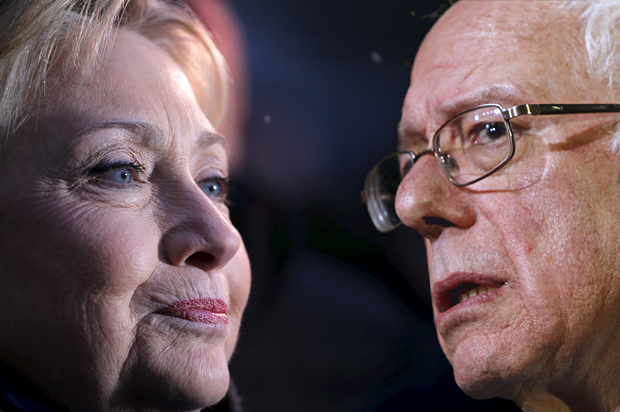One of the testier exchanges in Thursday night’s Democratic debate occurred when the topic of Wall Street was raised. This wasn’t surprising: Crony capitalism has been the dominant theme on the Democratic side. And Sanders has relentlessly attacked Clinton’s ties to the financial industry. Thursday night, however, the divide on this front was as glaring – and personal – as ever.
Asked about breaking up the banks and penalizing executives for malfeasance, Clinton touted her role in passing Dodd-Frank and added that “Executives of any of these organizations should be financially penalized if there is a settlement. They should have to pay up through compensation or bonuses because we have to go after not just the big giant institutions, we have to go after the people who are making the decisions in the institutions.”
The moderator, Dana Bash, promptly baited Sanders: “You have consistently criticized Secretary Clinton for accepting money from Wall Street. Can you name one decision that she made as senator that shows she favored banks because of the money she received?”
Sanders pounced: “The obvious decision is when the greed and recklessness and illegal behavior of Wall Street brought this country into the worst economic downturn since the Great Depression of the ’30s, when millions of people lost their jobs, and their homes, and their life savings, the obvious response to that is that you’ve got a bunch of fraudulent operators and that they have got to be broken up. That was my view way back, and I introduced legislation to do that. Now, Secretary Clinton was busy giving speeches to Goldman Sachs for $225,000 a speech.”
Clinton repeated her line about visiting Wall Street and “calling them out” on their reckless behavior. And she wisely noted Sanders’ inability to draw a straight line between her financial dealings and policy behavior: “Well, you can tell, Dana, he cannot come up with any example, because there is no example.”
Sanders responded mockingly: “Secretary Clinton called them out. Oh my goodness, they must have been really crushed by this. And was that before or after you received huge sums of money by giving speaking engagements? So they must have been very, very upset by what you did.”
Ultimately, this debate reduces to questions of trust and methods. Both candidates are pushing the same policies – the dispute is about mechanics and, more importantly, credibility. Sanders has every reason to question Clinton’s authenticity: Taking money from an industry you promise to regulate is problematic – for obvious reasons.
If there was any doubt about Sanders’ willingness to continue this line of attack, his latest campaign ad, released Friday, removed it. Although it’s only 30 seconds and fails to mention Clinton by name, the target and tone are clear enough. “Wall Street banks shower Washington politicians with campaign contributions and speaking fees,” the narrator says. “While Washington politicians are paid over $200,000 an hour for speeches [an obvious reference to Clinton], they oppose raising the living wage to $15 an hour… Two hundred thousand dollars an hour for them, but not even 15 bucks an hour for all Americans. Enough is enough.”
The contrast between Clinton’s hourly speaking fees and her position on minimum wage is new, and an indication of where the Sanders campaign is at strategically. Sanders has vowed not to go negative and to support Clinton if she becomes the nominee, but last night and today’s ad signal his intent to make Clinton’s integrity a cardinal issue.
Establishment Democrats will condemn Sanders for going ad hominem, but that’s not really true. In this case, Clinton’s personal financial dealings are relevant and fair game. The real anxiety among Democrats will be over Clinton’s long-term viability. They don’t want Sanders to do too much damage to Clinton before the general election. But Sanders’ campaign hinges on his authenticity and his unusually consistent record, and here the differences with Clinton are sharpest. He owes it to his campaign and his supporters to raise these questions. Besides, Clinton is more than capable of defending herself. And if she can’t deal with Sanders’ comparatively mild attack ads, she has no chance in November anyway.

